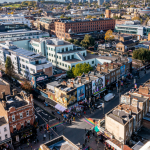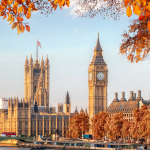There aren’t many constituencies in Greater London which can be considered a three-way fight, but Cities of London and Westminster is one of them. Last time around, Conservative Nickie Aiken came out top, but the Lib Dems surged into second place, pushing Labour into third. Just over 5,000 votes separate the three main parties.
This time around, and with a General Election due in the next 12 months and the polls currently pointing to a tough campaign ahead for the Tories, this constituency – which covers most of the West End, the heart of Government in Westminster, right across to the financial centre in the City – is likely to be a key battleground.
The Liberal Democrats have chosen Edward Lucas to fight the seat. Lucas is not your typical political hack. Not for him a background as a local councillor, or any of the other more traditional routes from political activism into Parliament. Instead, Lucas has a stellar career away from politics as a journalist – writing for publications including The Economist and The Times – where he specialises in central and eastern Europe, energy security, espionage and subversion. He speaks ten languages and for much of the last few decades, he’s lived abroad – in Moscow, Vienna, Berlin and the Baltic States, where he’s written extensively on the threats other countries face to their democracy.
But now he’s turned his attention to domestic politics. “Until a couple of years ago, I felt I didn’t need to worry about British politics very much”, says Lucas, “I thought it was in good hands, but I became quite alarmed after Brexit – how could this happen?” Radicalised by what was going on, he says he felt he had to do something – “and so here I am!”
Lucas draws considerably on his journalistic experiences when it comes to talking about his priorities should he become an MP. He’s passionate about the importance of net zero as “one of the biggest challenges we face”, and is concerned about how, in a constituency with many old and beautiful residential properties, the tough decisions about heating and insulation are going to be made and afforded.
Writing in The Times back in August, he complained about the inability to make “minor, even invisible tweaks” to properties in conservation areas in Westminster in order to bolster their sustainability credentials. “I have raised the conservation area problem with Westminster council. It says its hands are tied by national legislation that restricts any change to the outward appearance of a building in these areas. Yet in the face of a climate emergency, nitpicking is nuts. Few will care that conservation areas retain their centuries-old aesthetic when they are flooded by rising sea levels.” He continued: “The big point here is that government at all levels is failing to grasp the importance of energy efficiency, as the most neglected but vital part of our transition to net zero.”
Given the complicated politics of Westminster, Lucas gets that his role should he become the Lib Dem MP, will require him to work with the Labour council and Mayor. “I’m quite prepared to put pressure on the council on things like, why can’t we put heat pumps on roofs?” but recognises that conservation area rules – which affect a lot of the constituency – need interpreting, “not just flexibly but speedily so that we don’t have so many delays on projects”.
He also talks passionately about another of his campaigning issues, dirty money – the issue of illicit overseas cash flowing into London, primarily its prime residential market, which has led to extensive media coverage and regulatory changes in recent years, including the Economic Crime Bill. He is not alone in his concerns, with Westminster City Council also highlighting the practice on its doorstep. Lucas is forthright in this view, stating that: “voters don’t like the idea of a country run by the dodgy rich for the dodgy rich”, and he makes the point that this matters to local residents “because it’s no fun living next door to, below or above, some property owner whose identity is hidden and you can’t find out from the Land Registry who owns the neighbouring dwelling and if something goes wrong and you’ve got no real redress”.
His worries over the nature of property ownership in central London extends to what this means for vibrant and mixed communities. He argues that it “is in no one’s interest for central London to become a soulless playground for the super-rich” going on to say that “we need a wide mixture of people living here, both in terms of their economic and social background but also their ethnic and cultural diversity as well”. Lucas draws on his own experiences, describing when he lived in Knightsbridge – “I think we were the only people on Christmas Eve who had a light on – everyone else had gone away somewhere. And in some cases, it was short term lets and in other cases it was second, third, fourth or fifth homes somewhere else”.
Lucas’ enthusiasm for the constituency spills over as he talks passionately about the vibrancy, hustle and bustle and how it is, at its heart, a mix of villages. But he doesn’t pull his punches on some of the new construction that has gone on in recent years. “Badly thought-out development has stripped out the character of a lot of these places, so they become a bit soulless”, he says.
He wants to work with developers to avoid repeating the mistakes of the past, and to harness the “capability and expertise in the commercial sector that can make a big difference” to wider social challenges like homelessness, opportunities for young people and, of course, tackling net zero. He says that “the big property companies want to be good citizens but that doesn’t happen automatically” and that he’d use his role as the MP to “nudge them gently” into helping while “ensuring they get the recognition they deserve when they do it.” Lucas emphasises his belief in free markets, albeit qualified: “I don’t think free market economics gives us all the answers”.
Crime is his final priority area. Lucas notes that “we have some crime blackspots in this constituency where the police are only there during daylight hours and the rest of the time the gangs and hooligans have free rein. That’s a scandal when we’re only ten minutes’ bike ride away from New Scotland Yard”. In this context, he touches on the importance of challenging the myth that London is a uniformly rich city: “we also have a lot of poverty, and it is very important that the really hard-pressed parts of the constituency get the attention they deserve. This is partly about the state of the NHS – it bothers me a lot that people can’t get GP appointments and dental appointments”.
It’s unsurprising that the end of the interview touches on a topic so clearly shaped by Lucas’ experience of living abroad and writing on threats to democracy across the world. He talks about the importance of helping people to reconnect with the political system: “I want them to feel that I am there for them. I won’t always agree with them, I might not always be able to help, but at least I can listen”. He final comment is a stark warning to all political parties and candidates standing for election: “the greatest enemy of democracy is not Putin or organised crime but apathy”.
This interview was conducted by London Communications Agency on behalf of the London Property Alliance as part of its curation of the monthly Central London newsletter.
Read more from our London Leaders series here.


